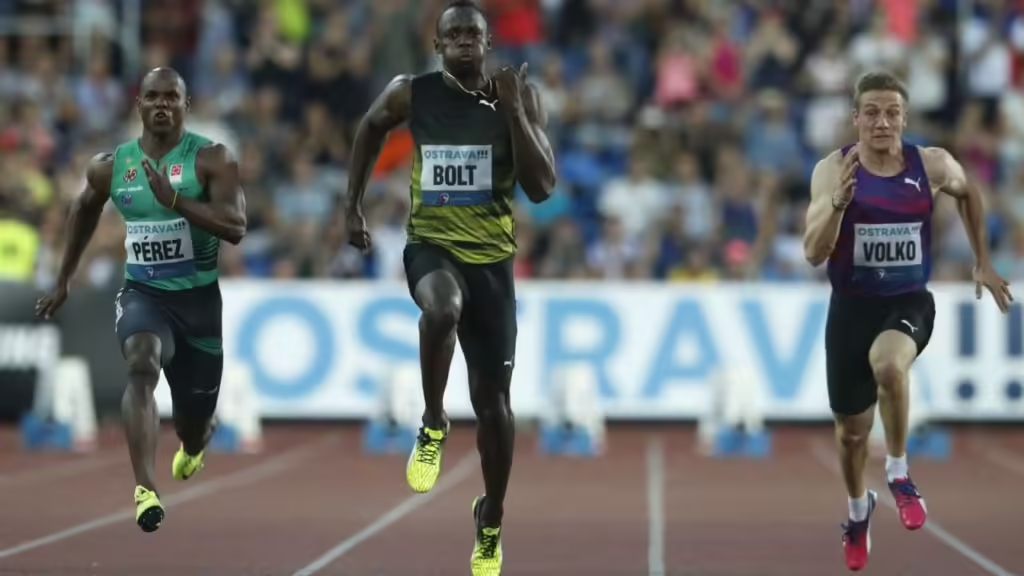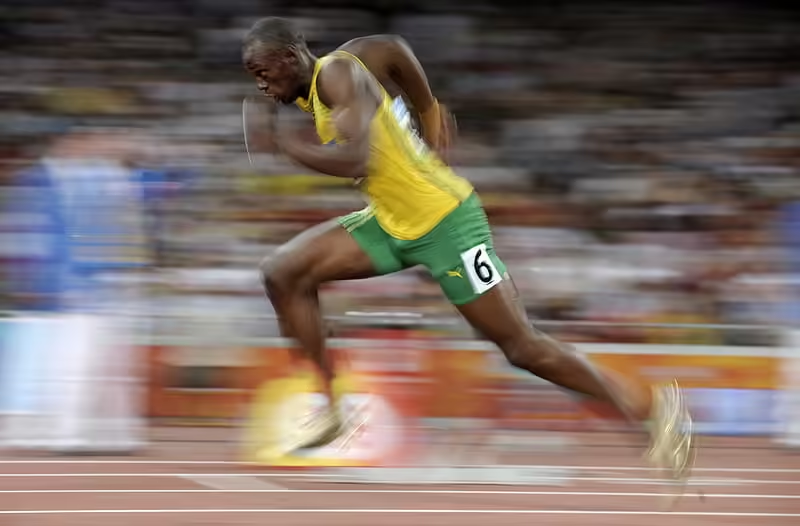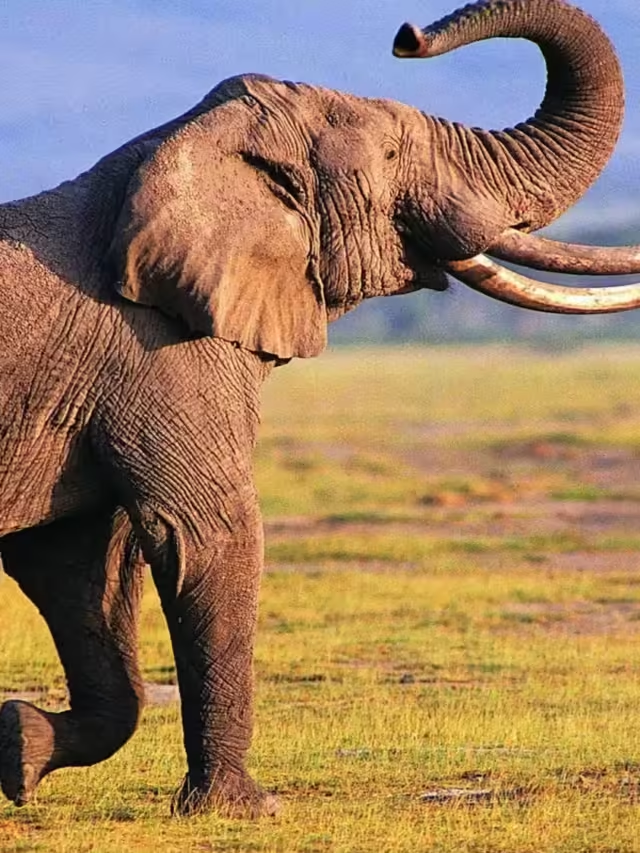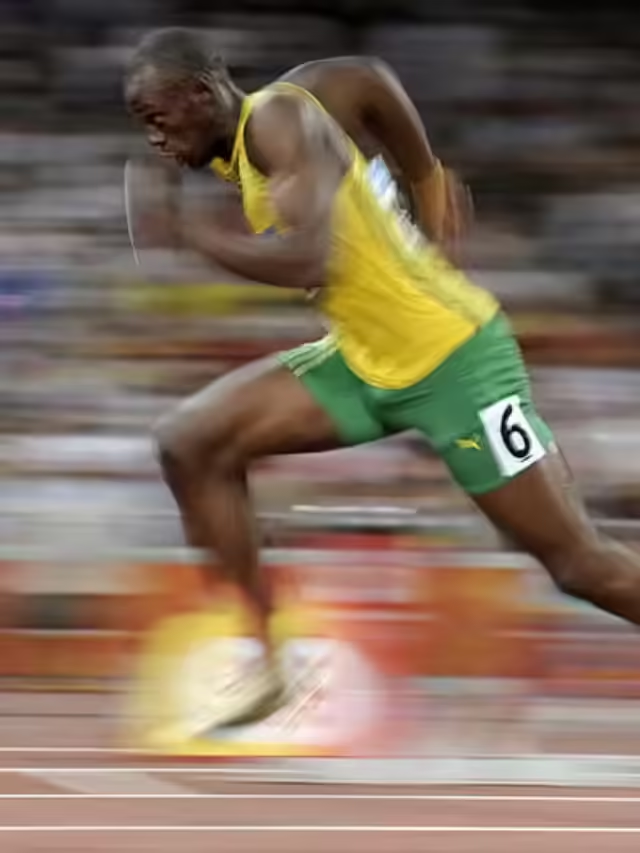100 m World Records: The Olympic 100 meters is one of the most entertaining events at the Games, showcasing the world’s quickest men.
It all began in 1896, when Thomas Burke from the United States won the inaugural gold medal in Athens. His distinctive “crouch start” strategy paved the way for how sprinters would approach races in the future.
As we entered the early twentieth century, American sprinters continued to dominate. Archie Hahn won in 1904, and Ralph Craig grabbed the gold in 1912. However, things changed slightly with the 1936 Berlin Olympics. That’s when Jesse Owens became a legend, not simply for his remarkable speed but for breaking racial barriers in the face of Nazis.
Following World War II, American sprinters such as Harrison Dillard, who won in 1948, and Bobby Morrow, the 1956 champion, maintained their supremacy. But then, in 1960, we saw a shift, with Armin Hary of Germany winning gold in Rome, shattering the American dominance.
Carl Lewis was born in the 1980s. He was an excellent athlete who won the 100 meters at the 1984 Los Angeles Olympics and went on to win nine Olympic gold medals in his career. Fast forward to the 1996 Atlanta Olympics, where Canadian sprinter Donovan Bailey broke a world record, truly testing the bounds of speed.
Then there’s Usain Bolt, the Jamaican sprinter who altered the game in the twenty-first century. He won the 100m in 2008, 2012, and 2016, becoming the first athlete to win three straight Olympic 100m titles. His demeanor, combined with his incredible record-breaking runs—such as his 9.58-second world record set outside of the Olympics in 2009—firmly established him as the best sprinter of all time. Most recently, we had Marcell Jacobs of Italy, who astonished everyone by capturing gold at the Tokyo 2020 Olympics, which were really held in 2021. It’s remarkable to see how the 100-meter sprint has changed throughout time. Each champion brought their own remarkable talent and contributed to historical events. It’s a very rich inheritance!

Table of Contents
Who is the fastest man in the world?
Usain Bolt became the fastest person in the world by running the 100m race in 9.58 seconds at the 2009 World Championships in Berlin.
Born in Trelawny, Jamaica, Bolt showed his speed from a young age. He first competed in the Olympics in 2004 in Athens, but he became a star in the 2008 Beijing Olympics by winning the 100 m, 200 m, and 4×100 m relay, all in world record times. He repeated these three wins at the London 2012 and Rio 2016 Olympics, making him the only athlete to win the 100 m and 200 m races in three straight Olympics.
Bolt won nine Olympic gold medals during his career. However, he had to return one gold medal from the 2008 Beijing 4x100m relay because his teammate, Nestor Carter, was found guilty of doping. Bolt retired in 2017, but his records and achievements are still unmatched.
Usain Bolt’s Unbreakable Record:
Usain Bolt holds the world records for the men’s 100m sprint with a time of 9.58 seconds and the 200 m sprint with a time of 19.19 seconds. He was also part of the Jamaican team, along with Yohan Blake, Nesta Carter, and Michael Frater, that set the world record for the 4×100 m relay. They achieved this record time of 36.84 seconds at the 2012 London Olympics.
Fastest Man in the world before Usain Bolt:
Usain Bolt wasn’t the only fast Jamaican runner of his time. Asafa Powell, another Jamaican sprinter, held the world record for the 100 m sprint before Bolt. Powell first set the record in June 2005 with a time of 9.77 seconds and then improved it to 9.74 seconds in September 2007.
100 m World Records: Here’s the list of Olympic men’s 100 m winners
Here’s the list of Olympic men’s 100 m winners in a three-column table format:
| Year | City | Winner | Time (Second) |
|---|---|---|---|
| 1896 | Athens | Thomas Burke (USA) | 12.0 |
| 1900 | Paris | Frank Jarvis (USA) | 11.0 |
| 1904 | St. Louis | Archie Hahn (USA) | 11.0 |
| 1908 | London | Reggie Walker (South Africa) | 10.8 |
| 1912 | Stockholm | Ralph Craig (USA) | 10.8 |
| 1920 | Antwerp | Charley Paddock (USA) | 10.8 |
| 1924 | Paris | Harold Abrahams (Great Britain) | 10.6 |
| 1928 | Amsterdam | Percy Williams (Canada) | 10.8 |
| 1932 | Los Angeles | Eddie Tolan (USA) | 10.3 |
| 1936 | Berlin | Jesse Owens (USA) | 10.3 |
| 1948 | London | Harrison Dillard (USA) | 10.3 |
| 1952 | Helsinki | Lindy Remigino (USA) | 10.4 |
| 1956 | Melbourne | Bobby Morrow (USA) | 10.5 |
| 1960 | Rome | Armin Hary (Germany) | 10.2 |
| 1964 | Tokyo | Bob Hayes (USA) | 10.0 |
| 1968 | Mexico City | Jim Hines (USA) | 9.95 |
| 1972 | Munich | Valeriy Borzov (USSR) | 10.14 |
| 1976 | Montreal | Hasely Crawford (Trinidad and Tobago) | 10.06 |
| 1980 | Moscow | Allan Wells (Great Britain) | 10.25 |
| 1984 | Los Angeles | Carl Lewis (USA) | 9.99 |
| 1988 | Seoul | Carl Lewis (USA) | 9.92 |
| 1992 | Barcelona | Linford Christie (Great Britain) | 9.96 |
| 1996 | Atlanta | Donovan Bailey (Canada) | 9.84 |
| 2000 | Sydney | Maurice Greene (USA) | 9.87 |
| 2004 | Athens | Justin Gatlin (USA) | 9.85 |
| 2008 | Beijing | Usain Bolt (Jamaica) | 9.69 |
| 2012 | London | Usain Bolt (Jamaica) | 9.63 |
| 2016 | Rio de Janeiro | Usain Bolt (Jamaica) | 9.81 |
| 2020 | Tokyo | Marcell Jacobs (Italy) | 9.80 |
All the information available are collected from official sources. You Can Check Here
Discover more from The Article Times
Subscribe to get the latest posts sent to your email.











